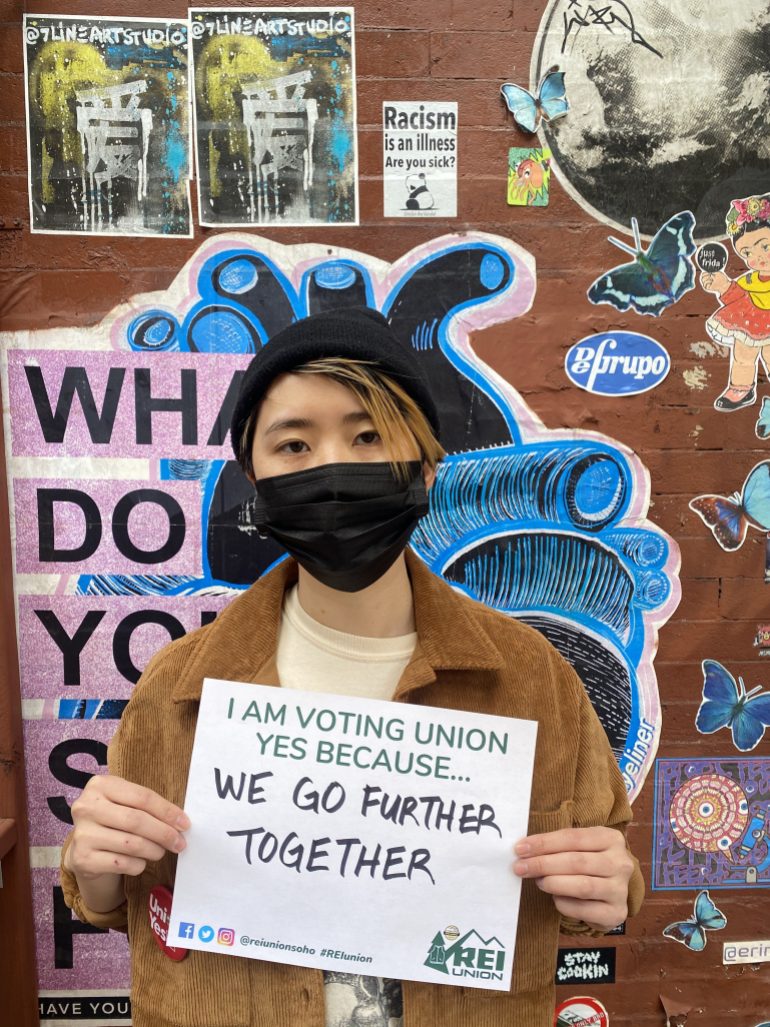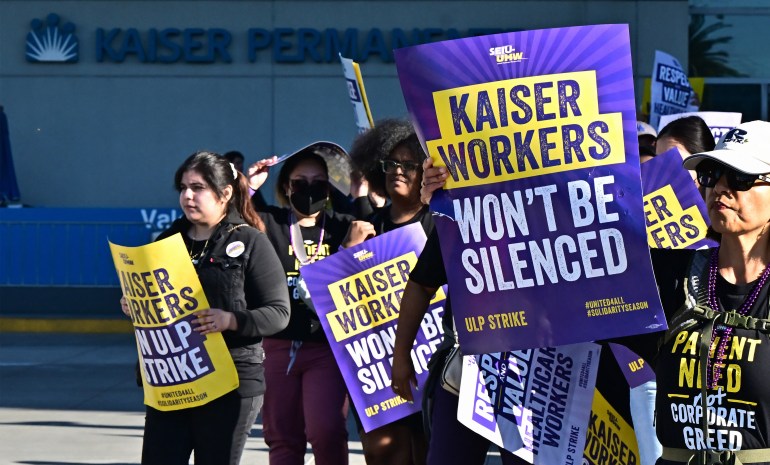As retailer REI’s troubles with employees continue, consumers back off
Once known as the beacon of corporate America, REI is now embroiled in face-offs with employees, putting off consumers.

Claire Chang, a visual merchandiser at sports goods retailer REI’s flagship location in New York City, was drawn to the company because of her then-blossoming love of the outdoors.
After working in an office setting, she said she looked for something a little less stressful. That’s what brought her to REI where she has now worked for six years.
Keep reading
list of 4 itemsFamily of Al Jazeera Arabic correspondent killed in Israeli attack
What do Israelis think of their gov’t handling of the captives’ crisis?
Pro-Russian former Ukrainian parliamentarian shot dead near Moscow
The company, considered to be a progressive beacon in corporate America known for its support of sustainability and Indigenous rights, among other issues, aligned with her interests and values. However, starting in October 2020, Chang says that began to change for her.
At the time, Chang and her colleagues pushed the company for increased health and safety protection amid the COVID-19 pandemic. Because of this, she was part of the first store to vote to unionise.
She felt that the Washington state-based cooperative retailer, formally known as Recreational Equipment Inc, has dragged its feet on union negotiations since then. Chang says they are still fighting for their first union contract, and negotiations started in June 2022.
That began a long and drawn-out battle between her colleagues and the company – a fight that is anything but over, and in early November, the Retail, Wholesale and Department Store Union (RWDSU) filed a complaint on behalf of the workers with the National Labor Relations Board.
The complaint alleges the sporting goods cooperative took actions that RWDSU referred to as “emotional manipulation and retaliatory actions against workers, such as firings, changes to work schedules and disciplinary practices”.
Banking on REI’s reputation as a progressive company, Chang says she hoped they would operate in good faith on union negotiations, but that hasn’t been her experience.
“In reality, they [REI] have been fighting us every step of the way from the beginning,” Chang told Al Jazeera.
Chang says she saw surveillance tactics used in her store and alleges that the company brought in senior executives to talk to them.
Last month there were worker walkouts at locations in Minnesota, Massachusetts and Illinois.
That was in response to what the RWDSU said was the “retailer’s decision to unilaterally restructure jobs and working conditions in all of its stores”.
In mid-October, the company eliminated 275 jobs.
Meanwhile, REI changed law firms amid the negotiations, which she says essentially started the process all over again, while the 85-year-old company reported a record $3.85bn in sales in 2022.
In an investor release, the company said that “in 2022, REI put an additional $50 million toward pay raises for hourly employees and delivered another $92 million toward employee retirement and bonuses”.
However, Chang says that was not her experience. She alleges that the company withheld those raises from her location amid union negotiations. REI did not respond to Al Jazeera’s request to confirm the validity of these claims.

‘Impact brand loyalty’
From a sales perspective, this year could be much different for the retailer – especially during this quarter, the holiday shopping season.
Thanks to a combination of more public pressure from the company’s already hyper-aware and socially conscious customer base, experts believe this could have an impact on holiday shopping.
“REI has a strong brand image associated with outdoor enthusiasts and a commitment to sustainability. If consumers perceive that the company is not living up to its values in terms of fair treatment of workers, it could erode trust and impact brand loyalty. This might prompt some consumers to reconsider shopping at REI during the holiday season,” said Linda Simpson, professor of financial literacy at Eastern Illinois University.
Chris Brinlee Jr is one of those consumers. Brinlee, who works in the outdoor industry, called out the sporting goods retailer on social media. On the company’s “cyberweek sale” Instagram post, he wrote, “I’d rather not spend any money at REI, ever, than to support a company that’s actively union busting.”
Brinlee Jr has more than 36,000 followers.
“One of the few ways as a consumer we can organise is choosing how and where we spend our money,” Brinlee told Al Jazeera.
“They are clearly acting against the interest of their employees,” he added.
“By going against the union, REI could be seen by its core consumer segments as going against its basic brand identity. Consumers are known to punish brands for transgressions,” Aparna Labroo, Professor of Marketing at Northwestern University’s Kellogg School of Business, told Al Jazeera.
That is exactly how Brinlee Jr feels. He shopped there easily once a month until he learned about the union-busting allegations at REI, and then he stopped. He says he’d consider returning when the company starts operating in good faith with its workers.
“The impact on consumer sentiment and shopping habits during the holiday season will depend on how the public perceives the union fight, how REI responds to the situation, and the values consumers prioritise when making purchasing decisions,” Simpson said.
Brinlee Jr’s position is far from isolated. Alex Bartolo, a wildlife biologist based in Long Beach, California, is among the other consumers that Al Jazeera spoke to who all say they are limiting or outright boycotting the store. Bartolo also has an REI credit card which he says he intends to cancel.
“I think if REI supported what their employees wanted, operated in good faith negotiations and stopped union busting, I would reconsider my opinion,” Bartolo told Al Jazeera.
REI did not respond to a request for comment.
Slowing economy

The confrontations at REI come at a time of an increase in the popularity of unions among ordinary Americans.
According to a Gallup poll in late August, 67 percent of Americans approved of unions. That’s the highest since the 1960s. Workers across sectors – ranging from Starbucks baristas to nurses at Kaiser Permanente healthcare facilities – took to the picket line this year to demand better working conditions.
Chang says she fully expects walkouts throughout the holiday season.
This comes amid a tough moment for retailers broadly because of high-interest rates and a slowing economy, which may push consumers to spend less.
According to a survey from PYMNTS, 77 percent of Americans plan to spend less this holiday season than in years past because of heightened interest rates. Moody’s, too, forecasts modest growth for the retail sector at a 1-3 percent bump – compared with 5.1 percent last year and 14 percent the year prior.
That’s a result of a downturn in spending, and an increase in the number of Americans living paycheck to paycheck. According to PYMNTS, that is 60 percent of Americans.
Labroo argues that sentiment helps the REI union’s momentum.
“People are struggling for liquidity – and when they’re struggling, they also become more acutely aware about how others may be struggling,” Labroo said.
For Chang, that translates into more support from the shopping public as she and her colleagues push for a seat at the table.